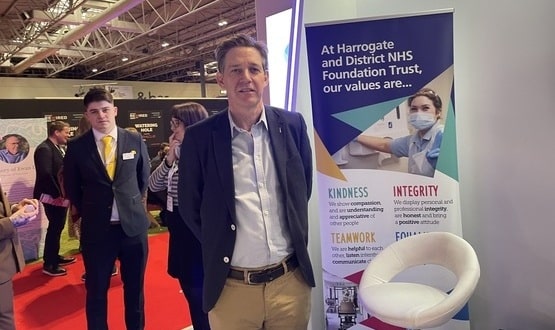Choose and Book fails on air
- 31 May 2006
Enthusiasts and sceptics among the GP community had their say about Choose and Book on a BBC investigation of the national e-booking system last night and one user had the embarrassing experience of taking the presenter through a booking that failed.
Dr Andrew Langton a GP in Avon who has carried on using Choose and Book despite a boycott by the local medical committee (LMC), took presenter, Gerry Northam, through the Choose and Book process, but when it came to printing out a selected appointment the system failed.
Dr Simon Bradley, an Avon GP who supports the LMC’s advice on not using Choose and Book says it is not as good as the electronic appointment system already available locally. He told the programme Choose and Book was “immature and slow” and “frequently not available”.
Asked how the NHS viewed the LMC’s stance, he said: “They are quite upset. They feel we are being obstructive… but in terms of what brings benefits for patients, I think we are being constructive.”
Chief executive of South Gloucestershire PCT, Penny Harris, agreed Choose and Book had been a tricky system to roll out but that upgrades were being made available all the time.
Commenting on the 1.7% use rate for booking in the PCT, she said: “I planned for a very low level to start with because I know they [the GPs] are so opposed to it.”
She said the failed referral at Dr Langton’s surgery was very unfortunate but added: “The important thing is to offer patients some choice and that’s what we need to work together to deliver.”
Dr Mark Davis of Hebden Bridge, Yorkshire, an advocate of the system, said: “It usually takes about five minutes to generate an appointment request and explain to the patient what they need to do next.”
He agreed this was quite a long time in a 10 minute appointment but said that he only had to do between five and eight referrals a week and “most of the patients have been surprised that the NHS is so responsive to their needs.”
Commenting for Connecting for Health (CfH), the national agency responsible for Choose and Book, clinical lead, Dr Simon Eccles, said the software now was vastly better than the “somewhat clunky” earlier versions.
He defended the practice of counting bookings made on interim systems into the national statistics for the system. These bookings do not provide an end-to-end service but do give the patient the facility to ring a call centre and make an appointment at a time of their choice.
“It’s not misleading because it’s such an improvement,” said Dr Eccles adding that the new service was loved by patients.
Some of the most damning criticism in the programme came from doctors in north and east London who revealed that they were still very unhappy with a child health system, supplied as a interim solution by BT which, as Capital Care Alliance, is the local service provider for London.
Reports in February listed problems with the Child Health Interim Application (CHIA). Among the many complaints about it, clinicians voiced concerns that vaccination recalls were not going out to parents whose babies and young children were due to have jabs.
Claims on the programme indicated that the authorities had lost track of 24,000 children in 10 PCTs in the north and east of the capital – one of Britain’s most deprived areas.
Dr Eccles said, on behalf of CfH, that staff were working “flat out” on the system and he believed it would be fit for purpose. He said claims that CHIA did not send out vaccination reminders were at variance with what he had been told.
One live demo that did work well for the programme was an encounter with the new patient administration system at the Queen Elizabeth Hospital, Birmingham. Demographic details were found swiftly and accurately.
Director of IT, Andrew Haw, said the new system would keep track of patients coming in an out of the hospital and of waiting times. He defended the £600,000 cost for an interim system.
“If you look at our previous business cases, we would have expected to [spend] something like £25m to implement a system of this type,” he said
Richard Bacon, an MP who sits on the Commons Public Accounts Committee and a long standing critic of CfH said the national programme was ordained from the centre and wished on people locally who didn’t have the money to pay for it.
He commented:“You have to ask: ‘What’s the point?’”
CFH commented: "In a programme of the size, scale and complexity of the National Programme for IT, it is to be expected that there will be issues and difficulties and we have been open about that. This kind of activity can be disruptive. But we do not believe that there should be a poverty of ambition and the current situation – where hundreds of different, and often ageing computer systems, do not link up – is not right for a modern health service.
"The issues that the BBC has reported must be seen in the wider context of a significant amount of progress that has been made to date. Up and down the country patients and clinicians are benefiting from new computer systems."
Link
A downloadable version of the programme is available at
http://news.bbc.co.uk/1/hi/programmes/file_on_4/5029516.stm
Detailed response from Connecting for Health
Related article
Report of a Medix UK survey commissioned for the File on 4 programme
Doctors back call for review of NHS digitisation




